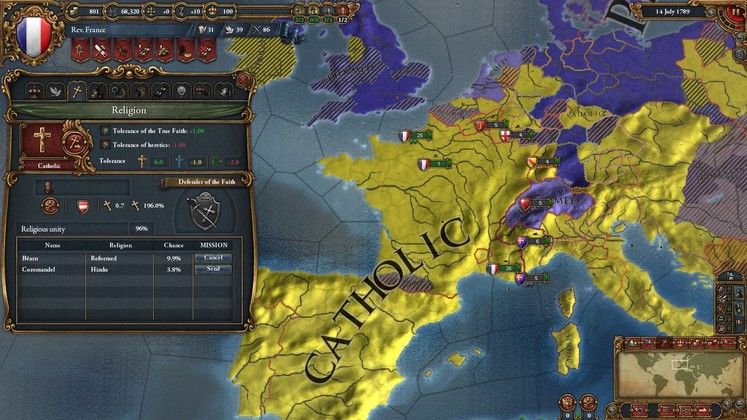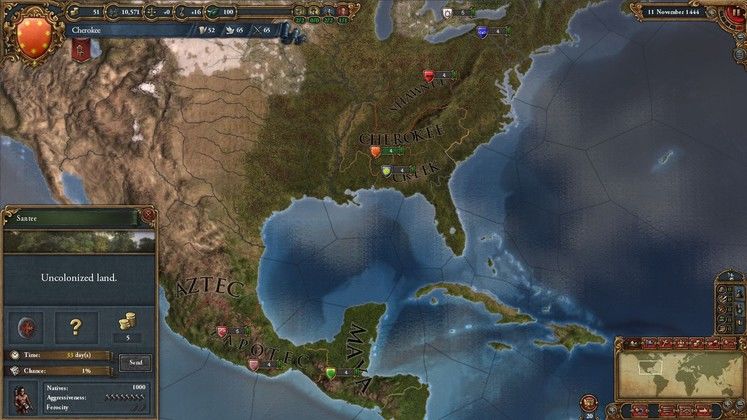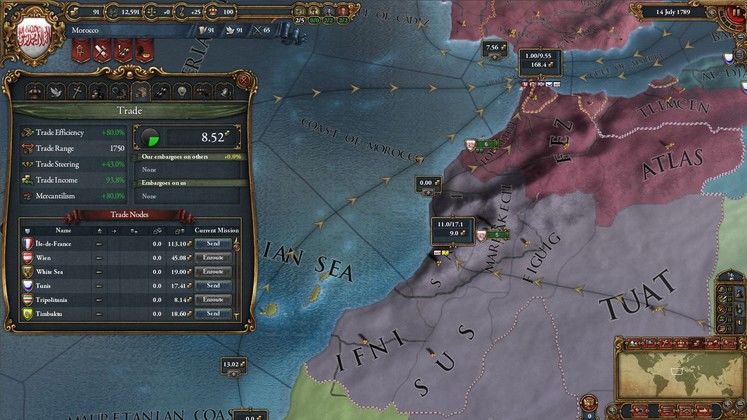In a recent visit to Stockholm, we were shoved in a room with 19 other journalists, YouTube-ers and some developers from a 20-man multiplayer mash-up. Paradox games have always traditionally been able to theoretically support up to 32 players, but the practice of it has always been questionable, with the backend technology never being that great. Typically, you’d need third-party software for connecting together at the very least, and perhaps even third-party chat software if that was important as well. With EUIV however, Paradox have finally taken a long, hard look at their Multiplayer, and the experience has been improved significantly. Tying the game to Steam’s multiplayer service has saved them a lot of time and money, and players of EUIV can enjoy all the support that offers. Hopefully this will make having large games over the internet more stable – our little endeavour, whilst it was relatively smooth (things started to unravel a bit here and there due to some drop outs on the second day), it was still a LAN set-up, which inherently has less potential problems.
 |
| The Protestant Reformation can happen in the game, although it’s not a fixed event. Sometimes it can seem a bit weak though |
We’ve mentioned this several time before in past coverage of Paradox games, and especially EU IV, but having real people in the game changes everything. All of the layers, the features, the experience... it’s all given that Diplomacy-esque political edge as now your neighbours are real people you have to interact with, not just an AI that you can ‘game’. This brings me back to the comment I made at the beginning of the article – Integrity. In this particular game, I was assigned to play as Castile, who shares the Iberian Peninsula with Portugal, and Aragon. To the North is France, and to the south is Morocco, Algeria and the rest of North-West Africa. Now, the way the game is set-up in terms of long-term goals, both Castile and Aragon can form ‘Spain’ and so are likely to come into conflict with each other. Similarly, Castile and Portugal are likely to come into conflict over trade and colonial influence. If I’d wanted to, I could have also gotten more involved in ‘European’ affairs, which could have taken up towards France, or even England, or across the Mediterranean. Thing is, Portugal and Aragon were played by people (as were France, England etc... but I didn’t care so much about that), and the Portuguese player (a very nice lady by the name of Nelle) was sitting right next to me, and didn’t really know how to play the game – sure, I could have been ‘that guy’ and wiped the floor with her, and the logical option was to wrestle control of the rest of the peninsular from Aragon too... but I decided not to.
Taking on Aragon early game is no easy feat – they’re roughly the same size and strength as you, and they start off with a ‘Personal Union’ (which is where two countries are ruled by the same King, due to a Royal Marriage) with Naples, so I would have had to fight two countries instead of one. Me and Aragon both agreed to leave each other alone for now, and we went about building up some strength – I kicked the last of the Muslims out of Spain, and started moving on North Africa, whilst I also made a deal with Portugal that essentially meant they’d give me money periodically and I’d leave them alone (I didn’t want to be a dick, but that doesn’t mean I couldn’t also be smart).
Taking the peaceful route allowed me to explore many of the other areas of the game – mainly trade & exploration, but it also allowed me to get involved in other people’s affairs in more creative ways. Eventually, Aragon decided that he wanted to have direct control over Naples, and used the Personal Union as an excuse to declare war – I decided to fund Naples against Aragon, which resulted in them losing the war and losing their alliance with Naples. Not long after that, I made Naples my ally, so not only did I gain a fairly strong friend in the Mediterranean, I’d also effectively neutralised Aragon as a threat for the foreseeable future. Again, I could have attacked him if I’d wanted to and formed Spain, but I decided having another player next to me (who was more than willing to do what I asked) would have been more useful. I also had an informal Non-Aggression Pact with France and every other major power near me, so with my European Affairs ‘Sorted’, I decided to look further afield.
The trade & exploration game is an interesting one, but once you get the hang of things it can be rather boring and uneventful – especially in the position I put myself in. Trade is a simple matter of dominating the various trade hubs or nodes that the world is divided into by increasing your Trade ‘power’. This can be done by owning as many provinces within a hub as you can, building improvements within those provinces to increase the individual trade power of each province, creating ‘Trade Fleets’ and having them patrol Trade Nodes to increase your power, and certain Idea and tech effects. Another means is to obviously fight wars with anyone else ‘active’ in a trade node, and having them give their trade power to you, but provided you play it smart you can pretty much dominate without needing to fight anyone.
 |
| The New World. Full of Wonders, Riches, Dangers, and a 24/7 Starbucks... |
Trade nodes require merchants in order to be useful to a faction, and most nations start out with two merchants, although that can vary. So far, the only way we know how to get more merchants is to choose Economic-focused Idea trees, which we’ll come to later. Nodes can be interacted with in two ways – Maintaining an Office, or Building Transit Hubs. If you maintain an office, you use your nation’s trade power in that hub to try and keep as much of the trade within the node as possible, and make money from it. Building a Transit hub uses trade power to steer the trade on to another node (Every trade node is connected to other trade nodes by predefined sea and land routes). The way the game is set up at the moment is that you get a bonus from maintaining an office in your home hub, but nowhere else, so essentially you always want to be steering your trade to your home hub.
As far as colonisation goes, apart from Portugal who starts off with the ability to explore and colonise, everyone else has to ‘catch up’ by picking specific ‘Idea’ or sub-trees. Technological progression Europa Universalis IV has two layers – there’s the main tech path, split into Administrative, Diplomatic and Military tech trees. Then there is the ‘Ideas’ system: every 4-5 levels that you progress on the Administrative Tech path, you unlock the ability to choose an idea sub-tree, again split between administrative, diplomatic and military. This essentially allows you to tailor your country towards a certain play style, or goal. For me, wanting to jump in as early as possible onto colonisation, my first idea tree was the one that allows me to explore and colonise. There are other idea trees that focus on a range of things from economy, religion, land army, your fleets etc... Both the main tech path, and the Idea sub-trees require points to unlock the various stages, and they all use the same pool of points. Points are generated by your nation’s leader, depending on his attributes, as well as advisors, and certain event effects. Early game can provide almost tactical management choices between keeping up with the overall tech progression, and levelling up Ideas for their bonuses. Once I’d made sure I wasn’t in any danger from anyone else, most of my early game was focused on developing my economy and preparing for my overseas adventures.
The thing is though – once you get out there, and you start colonising... it’s not as interesting as it could be. Even with an active Portuguese player, there’s actually plenty of space to share – despite the severe early-game limitations on where you can colonise. Until the map opens up for you a bit more, it really becomes a matter of ‘hopping’ from colony to colony, stretching out your max range each time to create a supply chain (once a colony has finished constructing and becomes a ‘normal’ province, you can then use it as a stepping stone to found a new colony further afield). The new world is oddly empty of other factions to engage with in certain places – South America is completely empty, with the Mayans, Incas et al occupying Central America, although there is a good selection of North American tribes. Also, every colonisable province has a ‘Native’ rating, which determines how hostile they are, how strong they are, etc... if you don’t have a garrison in the colony, then the colony could get wiped out, and there are also special events that allow you to interact with the natives (although not enough at the moment, I feel). Paradox’s aim with this mode however was for the real challenge to come from other European nations. In the myriad of single-players games I’ve played, it takes a while for anyone other than Portugal to get around to colonising, as most European nations have concerns in Europe that can distract them.
Even in our multiplayer session, it wasn’t until the tail-end of the second day that another European power joined me and Portugal across the Atlantic, and by then we’d run out time to really see how that would play out. Even though Colonisation is perfectly achievable in the early-to early mid game, it’s probably not until mid-late game that the real ‘interesting’ bit happens, as the various colonial powers start fighting for control. Personally, I think the natives and the native factions could provide more of a challenge, or one of the other European factions could be given a boost towards colonisation, just so there’s more early competition. Pro-Tip: Go for the Caribbean – you’ll be swimming in money.
 |
| Trade can be self-explanatory. You don’t really need to look at the stats, all you really need to ensure that you have a lot of power in any nodes you care about |
There are many more elements of EUIV that I could comment on based on what I’ve played so far – but with the majority of European gameplay focused on expansion through conquest, I felt it would be more interesting to talk about some of the non-aggressive gameplay options open to players. In reality, you really need to be on the western end of Europe to be able to colonise properly, or perhaps have access to the Mediterranean, conquer some poor North African state, then move down through Suez. This assumes though that you won’t have any trouble from your other European neighbours though, and in the early game focusing on the wrong thing can put you in some dire straits. Still, the old saying of “Money is Power” holds true in this game, so as long as you look after your economy, you should be ok.
Europa Universalis isn’t due out until the autumn, but it’s already an incredibly polished game, even more so than perhaps Crusader Kings II was at a similar point in its development. At the moment, I feel short-term and long-term goals and missions need tweaking more, as sometimes you can hit periods of nothing really going on, but this is certainly a game to look forward to. More important than this though, I hope the integration with Steam means that the multiplayer side of paradox games really makes it to the mainstream. Sure, you may not even know 32 people who own the game, but even if you can just get a handful, it will be an experience you won’t soon forget. Europa Universalis IV is due out on PC in Q3 2013.
Most Anticipated Feature: Would really like to see what the late game looks like – you can have colonial rebellions and new nations form, and then of course the political set-up will change game-to-game depending on what you’ve done.




